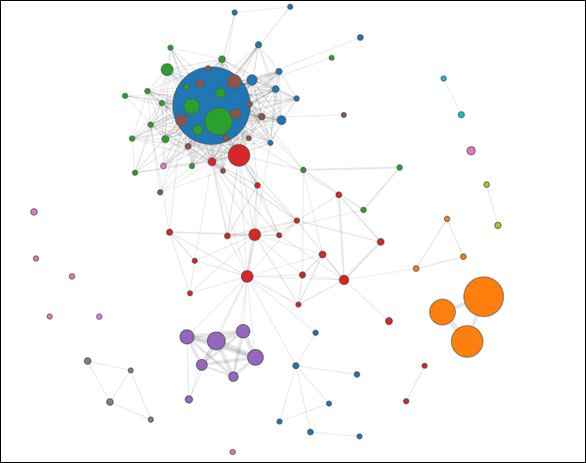
Immersion creates a map of the writer’s email account.
Your email inbox almost always looks the same. The content may change, but it’s still a chronological list — a narrow, time-based organization of correspondence, deeply set in the present. But a team from the MIT Media lab has created a new way for you to see your email, as an intimate and elegant visualization of your life organized around people.
Tracing the to, from, cc, and timestamp information on every email you’ve ever sent, a new tool called Immersion crafts a complex web of our lives and relationships. The program represents contacts as circles, and the sizes of the circles vary according to how many emails you’ve exchanged with each person. It charts your interactions with friends, family and coworkers for as far back as you’ve had your email address, and it automatically groups your contacts into social circles based on who is included on a thread. You can adjust the number of people who display in your visualization to hone in on your best friends, or to zoom out and see everyone you’ve ever emailed. Curious who you emailed the most in September 2010? You can adjust the time frame to focus in on a specific week. Immersion can even trace a specific relationship, from the first email sent, to the most recent exchange.
In this talk from TEDxCambridge, data scientists Deepak Jagdish and Daniel Smilkov introduce us to Immersion and share how it came to be. In the talk, they also dig into what Immersion does: offers an opportunity for us to take a step back and learn about ourselves from raw email data. The two see it as a chance for self-reflection and improvement. Deepak admits that Immersion revealed his unhealthy email habits: for example, that he sends way too many emails at 3 a.m. Immersion can also be a way to remember relationships as they evolve, to see connections as they decay or thrive over time.
Of course, this method has its limits. Maybe you have separate email accounts, or delete emails after they’re read. Maybe your grandma doesn’t have email, or your overeager uncle forwards you chain mail way too often. Maybe you have a pen-pal with whom you exchange hand-written letters, or you spend a lot of face-time with your closest friends. Immersion doesn’t measure the quality of your email communications, just the quantity.
Immersion also raises concerns about metadata privacy. “Trusting three mighty hackers with full access to your email metadata is probably not a good idea,” jokes Deepak in the talk. But in all seriousness, Deepak and Daniel acknowledge this risk, and close their talk with a reflection on the double-edged sword of metadata: it’s a powerful tool for us to get to know ourselves, but it’s also an entry point for any third party, like the NSA, to learn plenty about us as well.
After two decades with the Internet, it’s no longer just a medium of the present, but rather, an archive of our pasts. And, if we choose to embrace email metadata, it presents a powerful window into how we live, communicate and love in the 21st century.
Comments (28)
Pingback: The power of Gmail – Wikipreneurship